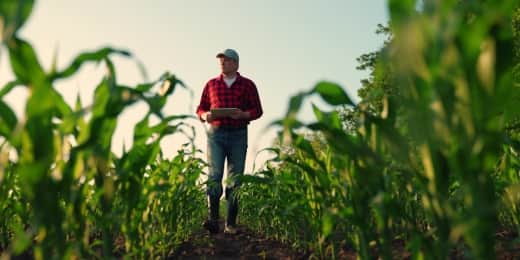A Comprehensive Guide to Farm Management
Learn more about farm management: what is it, why is it important, and how to manage your farm efficiently and effectively.

Published 24 Sept 2024
Article by
5 min read
What isFarm Management?
Farm management involves making decisions and overseeing all aspects of a farm’s operations. This includes crop production, livestock care, resource allocation, and financial planning. Managers need knowledge of agricultural technology, market trends, and environmental practices to manage farms effectively.
Importance
Farm management ensures the efficient use of resources, maximizing productivity and profitability while minimizing waste. It helps farmers adapt to market fluctuations, changing weather conditions, and technological advancements, safeguarding the long-term viability of their operations.
On top of that, effective farm management also boosts farm safety, ensuring that workers follow best practices and take all necessary precautions.
Key Aspects
Farm management can look different for every farm. This is because managers must make adjustments to their strategy based on the type of goods farmed, location, local regulations, and more. That said, there are certain key aspects of the process that can’t be overlooked. Below are some of the key aspects of farm management:
Financial Management
In farming, financial management includes budgeting, making investment decisions, and monitoring the farm’s cash flow to ensure profitability. It’s important because well-managed finances allow farmers to plan for growth, manage debts, and navigate economic challenges such as fluctuating commodity prices. Effective financial planning keeps the farm sustainable, particularly during tough seasons or market changes.
Crop and Livestock Management
Crop and livestock management involves the care, production, and health of plants and animals, including dairy cows and poultry. This aspect is vital because it directly affects the quality and quantity of products, influencing farm income and market competitiveness. Proper management ensures optimal yields and prevents issues like disease outbreaks, helping farms meet market demand while maintaining efficiency.
Resource Management
Resource management focuses on the careful use of land, water, and energy to maximize farm productivity while protecting the environment. It is critical because inefficient use of resources can lead to soil depletion, water shortages, and increased operational costs. By adopting sustainable practices, farmers can ensure long-term farm viability and reduce their environmental footprint.
Technology Used in Farm Management
Technology plays a big role in modern farm management. Various developments have improved farming practices, such as Internet-of-Things (IoT) agriculture, which integrates smart devices with farming practices. The types of technology used to manage farms can vary, but below are a few examples:
Precision Farming
Precision farming involves using technologies like GPS,sensors, and data analytics to monitor and manage crops and soil conditions with great accuracy. It helps farmers apply inputs like water, fertilizer, and pesticides in precise amounts, reducing waste and improving yields. This technology is important because it enhances efficiency, lowers costs, and supports environmentally sustainable farming practices.
Farm Management Software
A farm management software is a digital tool that allows farmers to track, analyze, and optimize every aspect of their farm operations, from finances to crop production. It helps streamline decision-making by providing real-time data on resource use, crop growth, and livestock health. This software is crucial for improving efficiency, reducing errors, and managing complex farm operations more effectively.
Achieve operational excellence
Cultivate a culture of excellence with our digital solutions that enhance efficiency, agility, and continuous improvement across all operations.
Robotics
Robotics in farming include automated machines like harvesters, drones, and milking systems that handle repetitive or labor-intensive tasks. These machines, especially when managed with help from an asset and equipment management system, help reduce the need for manual labor, increase precision in processes like harvesting, and improve productivity. Robotics is important because it lowers labor costs, boosts efficiency, and allows farmers to scale operations more easily.
Challenges in Farm Management
Farm management isn’t easy, and it’s common for managers to run into problems along the way. Managers can navigate these difficulties differently, but one of the first steps to countering challenges is preparing for them. Here are a few of the common challenges farm managers face:
Climate and Environmental Challenges
Climate and environmental challenges, such as unpredictable weather patterns, droughts, and soil degradation, make it difficult for farmers to maintain consistent crop and livestock production. These challenges can lead to reduced yields, increased costs for inputs like water, and disruptions in planting or harvesting schedules. Addressing these issues requires adaptive strategies and sustainable practices, which are critical to ensuring long-term farm viability.
Market and Economic Pressures
Market and economic pressures include fluctuating commodity prices,changing demands, rising input costs, and global trade uncertainties, which can affect farm profitability. Farmers often face tight profit margins and must compete in volatile markets, making financial planning and risk management crucial. Navigating these pressures is essential to staying competitive and ensuring the economic sustainability of farm operations.
Technological and Knowledge Gaps
Technological and knowledge gaps occur when farmers lack access to the latest innovations or the expertise to effectively implement new tools and techniques. This can limit productivity, efficiency, and the ability to adopt sustainable practices, putting farms at a disadvantage.
Bridging these gaps is important to enhance farm performance, keep up with industry advancements, and address challenges like resource shortages and labor constraints. This can be done with help from an operational efficiency platform such as SafetyCulture, which not only aims to address technical and knowledge gaps, but also streamline and monitor changes, keep track of issues, and improve overall management practices with checklists,asset management solutions, and smart data analysis features. A digital tool such as this can also provide insights on which farm equipment need maintenance, and when and how it would be best to provide it. All data will then be stored in the cloud for easy referencing, providing farm managers real-time data at all times.
Improve Farm Management Practices with SafetyCulture
Why Use SafetyCulture?
SafetyCulture is a mobile-first operations platform adopted across industries such as manufacturing, mining, construction, retail, and hospitality. It’s designed to equip leaders and working teams with the knowledge and tools to do their best work—to the safest and highest standard.
Streamline processes, eliminate bottlenecks, enhance resource utilization, and build an agile and scalable infrastructure with SafetyCulture. Strive for operational excellence to boost competitive advantage, foster sustainable growth, and deliver long-term value.
✓ Save time and reduce costs ✓ Stay on top of risks and incidents ✓ Boost productivity and efficiency ✓ Enhance communication and collaboration ✓ Discover improvement opportunities ✓ Make data-driven business decisions
FAQs about Farm Management
Related articles
Operations
Business Processes

Understanding the Importance of Process Automation Reliability
Learn how reliable process automation is key to safe, consistent operations and how it minimizes quality and compliance risks.
Logistics
Operations

Transportation and Logistics: What’s the Difference?
Learn about the importance of transport and logistics within the supply chain and how it is used in business operations.
Logistics
Operations

An Overview of Transport Network Analysis
Learn about transport network analysis and how network-level insight improves reliability and reduces operational risk.